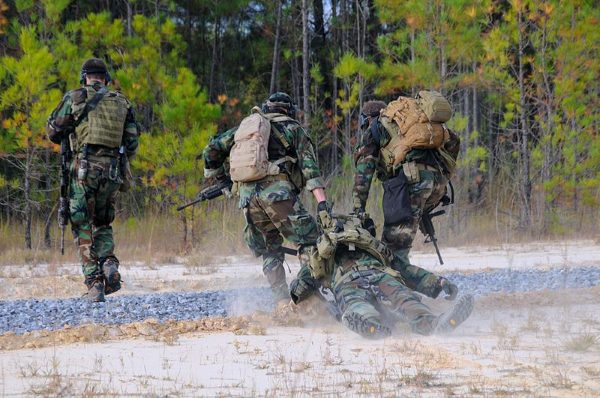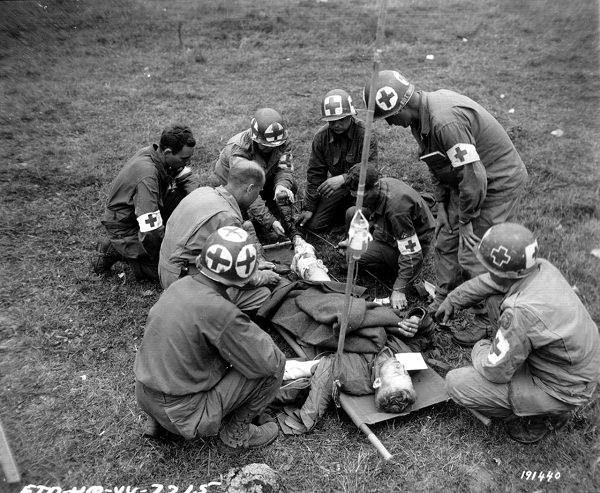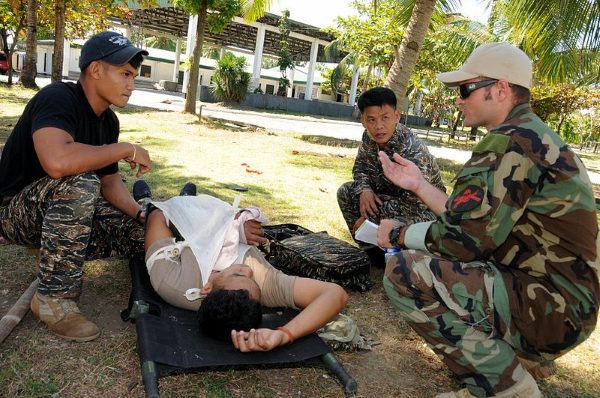Navy SEALs do their best work in dangerous conditions with serious risk to life and limb. So, they rely on Navy SEAL medics for treatment, if necessary.
The Navy SEALS operate independently and often must rely only on themselves for support.
Therefore, SEALs must have medics who can triage and give immediate care until they can be evacuated to medical facilities.
Combat medics must have the ability to respond calmly to chaos in a crisis in even the most dangerous situations.
Related Article – Navy SEAL Training: Basic Underwater Demolition / SEAL (BUD/S) Training
1. What Do Navy SEAL Medics Do?

Navy SEAL medics handle combat casualty care in the field. They perform services you would normally expect from emergency medical services or paramedics.
Navy SEAL medics focus on trauma and have trained and prepared to render medical care in a crisis.
It’s essential to note that Navy SEAL medics have training in more than one area.
The SEAL medic is also a qualified special forces operator on the SEAL team.
Therefore, a Navy SEAL medic has the flexibility to perform with more than one designation, which makes the SEAL team even more capable and flexible.
Related Article – Navy SEALS vs Marines
2. Navy SEAL Medic Requirements
To become a Navy SEAL medic, you must first qualify for and train as a Navy SEAL.
After graduation from SQT (SEAL Qualification Training), a Navy SEAL medic must complete the Special Operations Combat Medic (SOCM) course.
Requirements to become a Navy SEAL are rather stringent. They include:
- 28 years of age or younger
- U.S. Citizen and able to pass a security clearance investigation
- Meet the physical fitness and height and weight standards of the Navy
- Meet specific eyesight requirements, which include 20/40 best eye; 20/70 worst eye; correctable to 20/25 with no color blindness
- Have normal hearing
- Meet the minimum Armed Services Vocational Aptitude Battery (ASVAB) score: GS+MC+EI=170 or VE+MK+MC+CS=220 or VE+AR=110 MC=50
- Pass a physical examination required for divers
- Be a U.S. citizen and eligible for security clearance
If a recruit can meet the qualifications above, they’ll discuss a Special Operator enlistment contract with a Navy recruiter. For those already enlisted, there may be other requirements to satisfy.
The first step on the path to becoming a Navy SEALs medic is Boot Camp. Navy Boot Camp lasts for 10 weeks at at Great Lakes Naval Training Center, north of Chicago, Illinois.
New recruits with a Special Operator contract will finish boot camp and go directly to the Naval Special Warfare Preparatory School for 8 weeks.
Then, they attend the Naval Special Warfare Basic Orientation, which is 7 weeks.
Following that is the infamous Basic Underwater Demolition School, also known as BUD/S.
After months of physically and mentally grueling conditioning, you’ll head to SQT for 26 weeks (or 6 months) of advanced SEAL training.
Finally, a Navy SEAL medic will attend the Special Operations Combat Medic (SOCM) course.
The Special Operations Combat Medic Course is 26 weeks long and its aim is to teach the combat medic enough skills to manage casualties in a combat situation.
Afterward, SEAL medics must complete regular and ongoing training to stay on top of relevant skills and needs.
3. Navy SEAL Medic Training
To become a Navy SEAL Medic, a recruit must complete the SOCM course after qualifying as a Navy SEAL.
The SOCM course is held at Fort Liberty, North Carolina. It takes those with little to no medical experience and teaches them the fundamental skills needed for combat medicine.
Navy SEAL Medics learn how to handle combat trauma and tactical casualties during the course.
Medics learn the entire continuum of care from the moment of the injury until evacuation to a facility.
It is also vital to note that combat medics learn, during their training, a tremendous amount of skills beyond basic medical and life-saving tactics.
A combat medic learns the dangers of injury under battle conditions. These dangers include the risk of infection and even sepsis.
Also, medics must be aware of diagnosing and treating the effects of chemical and biological warfare while performing life-saving techniques.
Medical Fundamentals
The first seven weeks of training cover pharmacy, anatomy, terminology, and basic techniques related to physical exams, to name just a few.
Special Operation Combat Medic Trauma Training
The next seven weeks of training include basic life support and how to manage an obstructed airway.
Also, students train to manage trauma emergencies, trauma tasks, dive medicine, and operating room procedures.
Students also learn advanced trauma skills and minor surgical skills.
Furthermore, they learn about obstetric and pediatric emergencies, as well as cardiac emergencies during the trauma modules.
Clinicals
For the next four weeks, medics are in a clinical intern rotation at Level 1 Trauma Centers to work in an ambulance and the hospital.
Students work with the emergency department, surgical care, pediatric, labor and delivery, pediatrics, and the operating room during these rotations.
Military Medicine
The final three weeks of training are learning to handle the routine sick call care for patients who are ill.
In these weeks, you will work under the supervision of a doctor or a physician’s assistant.
Related Article – 8 Navy SEAL Benefits
Frequently Asked Questions (FAQ)

We address some frequently asked questions about becoming a Navy SEAL Medic below.
4. What Are the Benefits of Becoming a SEAL Medic?
A SEAL medic is a well-trained soldier, and that leads to numerous benefits.
The training itself leads to many options as a civilian.
Also, the distinction of being a SEAL operator with a medical designation will make you a critical member of the team.
5. How Much Does a Navy SEAL Medic Make?
a Navy SEAL makes as much money as anyone else in the Navy regarding base pay.
The Navy considers time in rate and rank as well as the number of years in service.
Also, this amount adjusts depending on your status as an enlisted member or officer.
However, the SEALs do receive hazard pay.
Also, they qualify for passing a test to be eligible for the SEALs and another for completing the training.
6. What is the Difference Between a Navy Corpsman and a Medic?
The Navy calls their medics “corpsmen” after the U.S. Navy’s Hospital Corps.
A corpsman serves with the Navy or the Marines and works on ships and in clinical settings.
A SEAL medic is still a SEAL who operates in the unit as a combat medic.
7. What Kinds of Job Opportunities Does a Navy SEAL Medic Have After Service?
A SEAL operator with a medic designation earns credits toward a medical degree.
Also, a combat medic can take a test to become a paramedic as a civilian.
Many combat medics take a few extra classes to become Physician Assistants.
Also, they could go into nursing.
Related Article – US Navy SEALs Rank Structure, Insignia, and Pay
Conclusion
SEAL teams work independently and often without support.
Because of this, they must handle their own needs in dangerous situations.
A SEAL often has another designation, allowing them to serve their unit in other capacities.
Therefore, a SEAL may attend the Special Operations Combat Training Course to become a SEAL Combat Medic.
Once trained and working as a medic, there is ongoing training to maintain the skills necessary to serve in this capacity.
However, all of the training translates well into the civilian world.
A combat medic can take a test for a licensed paramedic.
Other medics take a few extra classes to become a Physician Assistant or even go into nursing.
References:
- Replacing Dog Tags: 6 Things You Need to Know - June 28, 2024
- Navy OAR Test Study Guide - June 24, 2024
- 10 Best Sniper Movies of all Time - June 20, 2024
Originally posted on November 3, 2020 @ 1:46 pm
Affiliate Disclosure: This post may contain affiliate links. If you click and purchase, I may receive a small commission at no extra cost to you. I only recommend products I have personally vetted. Learn more.

